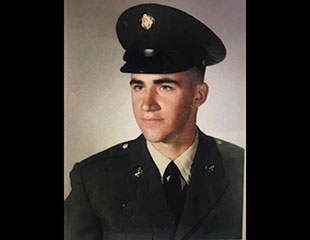20 Questions Changed This Veteran’s Life
3-minute read
20 Questions Changed This Veteran’s Life
3-minute read
Sitting in the psychologist’s office, Bud, an Army Veteran, flipped over the page of a questionnaire about his drinking to look at the results. What he saw was both conclusive and chilling. As he recalls, answering yes to 3 or more of the 20 questions indicated that you had a drinking problem. Bud had answered yes to about 12.
“I had 2 thoughts,” Bud says. The first was that if he admitted to having a drinking problem, it would mean he could never drink again. That prospect scared him. But the second thought was one of relief: He could now name what he’d been experiencing.
That second thought prevailed, and since that moment, Bud hasn’t looked back.

I needed to correct my Vietnam experience
A friendly beginning with a tragic end
Bud’s military service in Vietnam began in a spirit of cross-cultural fellowship. He was assigned to a civil affairs unit and was working with the native people of the area, the Montagnards. “We became friends with them, brought them over to our camp, and had dinners, and so on. And I thought to myself, this is the greatest thing.”
But this was war, and one day everything changed. “The order came down that this one village that we had become quite close to was communist sympathizers.” A subsequent order was to burn the village and send surviving inhabitants to refugee camps.
For Bud, this was both a devastating turn of events and a weight that would remain on his conscience.
Coming home
Then came the alcohol. “Drinking was not really an issue in Vietnam, because we were so busy,” Bud says. However, that was not the case when he returned to civilian life. He started drinking heavily to try to cope with PTSD. Then, after drinking, he would often get into barroom fights. “I got that reputation of this Vietnam Veteran that you never knew what he was going to do,” Bud says.
He knew something had to change.
Making amends for Vietnam
Feeling a lack of purpose in his life, Bud’s initial impulse was to try to make up for the events he’d gone through in Vietnam. “I knew I needed to do something to correct that Vietnam experience,” he says.
At first, he thought of joining the Peace Corps. Later, developing an interest in religion, he joined a seminary and began to study for the priesthood. In this new setting, drinking was not a problem, since he did not have access to alcohol. However, without the alcohol, Bud’s PTSD symptoms became much more apparent. Bud’s novice master noticed his change in behavior and sent him to a psychologist.
This was where Bud began to come to terms with his alcohol misuse and seek help.
Looking forward
From that point, Bud began to see a counselor and participate in a self-help group. As his healing progressed, his life began to improve. He has now been married for nearly 30 years, and he has an adopted son. He has replaced the lack of purpose he once felt with a sense of joy and stability.
At the same time, he does not take that happiness for granted. “Don’t underestimate the power of addiction,” Bud says. He adds, “Keep your recovery number one always, because if you don’t, you can lose it.”
